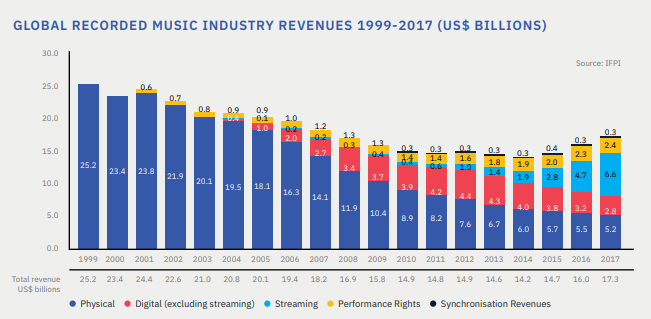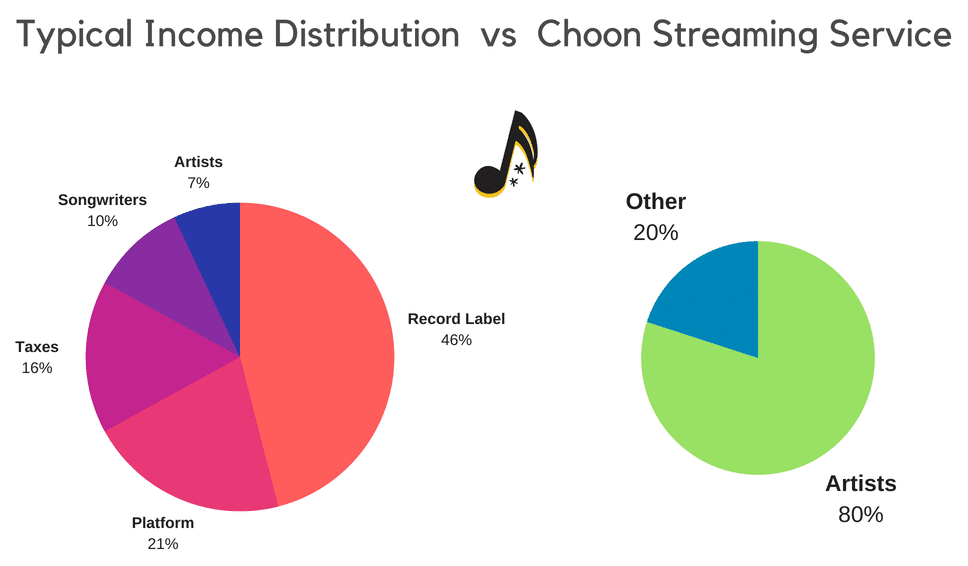Artists usually don’t make for good business people. After all, they would prefer to focus on their craft. And typically they don’t have access to marketers, lawyers and managers which makes it easier for middlemen to exploit them compared to other professionals. This industry has some of the most deeply entrenched middlemen in the world of business. But introducing blockchain into the music industry could change all of that.
The global recorded music industry brought in $17.3 billion in revenues in 2017 alone. That’s a lot of dough! Sadly, record labels funnel most of this revenue away from artists towards themselves. It’s rather ironic that the people creating the most value in the system are usually the ones receiving the least.
Several blockchain startups are emerging to deal with this problem. Make no mistake, the music industry is ripe for disruption.
Ownership Rights
Despite years of technological progress, society still hasn’t created a concrete way to manage artists ownership rights in a fair and transparent way. Rights remain largely in control of the record labels who have enormous legal resources. In 2015 legendary musician Prince warned young artists of the dangers of record contracts, citing them as a type of modern-day slavery.
“Record contracts are just like – I’m gonna say the word – slavery. I would tell any young artist… don’t sign.”
Let’s take a look at a few projects springing up to solve this problem:
Project Ujo
Projects like Ujo are using crypto technology to create a decentralized database of rights and rights owners for musicians. Since Ujo is built on the Ethereum blockchain, the developers aim to automate royalty payments with Ethereum’s smart contract solutions.

Ujo has created an artist portal where artists have full control over their published works. Upload your original work and decide your payment rate and how your music is consumed. It’s not entirely clear yet how Ujo achieves this, but they most likely store the most important data (like creator identity, licensing options, and distribution channels) on the blockchain.
Project Mycelia
Mycelia Creative Passport is a project pioneered by Imogen Heap. Imogen is no stranger to the cryptocurrency industry. She has been experimenting with blockchain in the music industry since around 2014. Mycelia is a research and development hub for music makers. They aim to ensure that the music industry fully acknowledges and pays for an artists services.
Imogen will be touring worldwide in 2018 in an effort to showcase Creative Passport which also aims to empower musicians to manage their own published works:
“Using emergent blockchain technology, featuring template ‘smart contracts’, the ‘Creative Passport’ will enable quick and easy direct payments, to simplify and democratise collaboration from meaningful commercial partnerships to creativity.”
Streaming Services
Streaming is the fastest growing segment in the music industry. As cheaper and faster internet becomes more widely available worldwide, these services continue to take a chunk out of traditional revenue channels like CD’s, LP’s and digital downloads.

Most people are familiar with popular streaming services like Spotify, Apple Music or Pandora. However, these companies are highly centralized and in many cases do not fairly represent the artists on their platforms. In 2015 Spotify was hit with a $150 million class-action lawsuit over unpaid royalties.
Artists have to completely trust that platforms will pay them fairly and provide them with accurate streaming analytics. It’s no wonder then that blockchain music streaming services are in the works:
Project Bitsong
Bitsong claims to be one of the first decentralized blockchain music streaming platforms. The platform pays artists and even listeners! Advertisers can promote their content over the Bitsong network but it’s the users who decide if and when they want to consume the adverts. In these cases, Bitsong will credit the user 90% of the advertiser’s investment.
Artists, on the other hand, can sell their songs and receive donations from listeners. Bitsong is currently launching their ICO (July 2018) and intend to pay artists and users on the network with their native BTSG token.
Project Choon
Choon is another blockchain music streaming startup with a vision of fair pay for musicians. Choon wants to help artists keep a whopping 80% of their income versus traditional distribution methods:

They are led by the highly experienced artist and producer Gareth Emery. Their token sale will begin in July of 2018 and run until August. As with Bitsong, Choon will also be creating their own native token called NOTES to distribute to users and artists over the network.
Risks
Pie in the Sky
Blockchain has the dubious honor of solving all of man’s problems… by default. Access to funding is almost certainly not the problem as many of these projects have shown. However, follow through with the professional development of the platform is.
Many projects are sitting on huge amounts of cash. Clearly, developers, marketers, and managers need to get paid and business expenses need to be taken care of. But the temptation to dump a project’s native token for something more valuable like Bitcoin remains strong.
Most projects claim their artists will get paid in native tokens but can you buy bread or pay your rent with native tokens? There is a real risk of artists dumping their tokens as they get them. This kind of downward pressure on prices could ultimately cause artists to want to get paid in something that actually holds its value and can be exchanged easily, like Bitcoin or Ethereum.
Not Going to Take it Lying Down
In addition, don’t think that record labels are just going to sit around and watch as blockchain moves in on the industry. Large record labels have the time, money and resources to launch their own projects or possibly even undermine others. The music industry is notorious for fighting piracy and we can expect some of these tactics to transfer over as they become threatened by blockchain tech.
Final Thoughts: Blockchain in the Music Industry
We need to keep the fundamentals of cryptocurrencies at the center of any discussion about real change. Is the network realistically decentralized? Will the project add value for all participants in the network: artists, listeners, and the project team alike?
It’s true that rent-seeking has existed in the music industry for decades. But now, blockchain is knocking on the door of these fat cats. However, blockchain is just a tool, and any tool can be used for either positive or negative outcomes. Blockchain in the music industry is mostly a theory at this time. Startups now need to actually start delivering on their promises.
The projects that survive will be those that provide real value: Those that build real networks by keeping artists and listeners at the heart of the music industry.
[thrive_leads id=’5219′]






